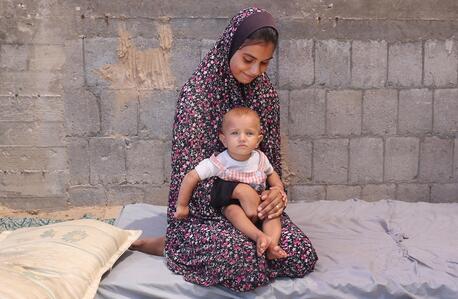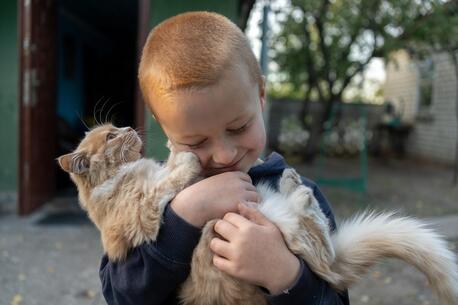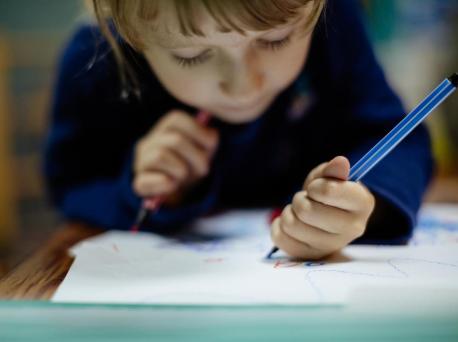
Helping Children With Disabilities in Wartime Ukraine
As the war in Ukraine rages on, UNICEF and partners are helping children with disabilities get the support they need to thrive.
More than 14 million people have been forced out of their homes by the war in Ukraine, leaving parents struggling to keep their children safe and healthy in the midst of a national nightmare. For families of children with disabilities, uprooted from their familiar routines and support systems, the challenges can be even greater.
Heavy shelling drove 4-year-old Theona, who has autism spectrum disorder, and her family out of their house near Kherson in southern Ukraine. Now staying almost 600 miles away in Lviv, she is getting help from specialists at Dzherelo Children's Rehabilitation Center, with support from UNICEF.
Here, she is learning how to communicate through the Picture Exchange Communication System (PECS), which uses a set of picture cards to explain her feelings.
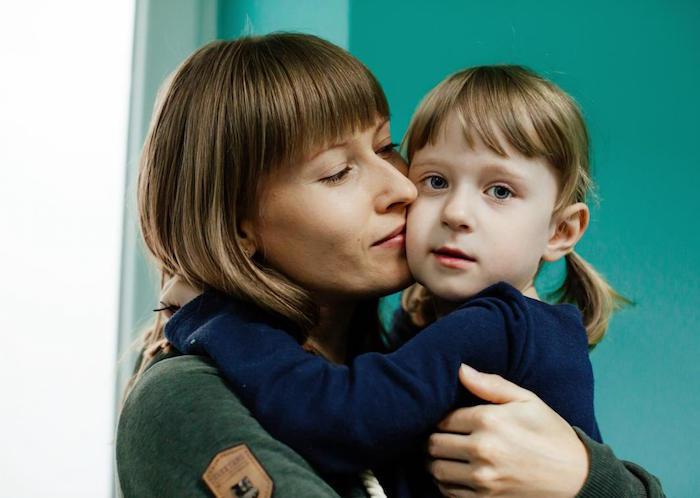
Four-year-old Theona, who has autism spectrum disorder, loves drawing, trampolining, dressing up, doing her hair and hugging her mother. © UNICEF
Escape from Kherson
"The explosions occurred next to our house,” said Victoria, Theona’s mother. “A blast wave made the curtains move in and out of the open window. We couldn't believe that was happening. You just don't know what to do.”
For weeks, the family lived in darkness, covering the windows tightly with curtains and plywood to avoid shattered glass in the event of shelling. When they heard explosions or saw missiles flying through the air, they ran to the basement.
"Theona covered her ears with her hands and couldn't understand why she should stop playing," Victoria recalled. "She screamed and tried to run upstairs. That was a stress for all of us."
Victoria searched high and low for a driver who would agree to bring a child with a disability. In the end, they shared the journey with a neighbor and his family. The journey took two days and, although Theona wanted to run and play, she had to remain in the car.
The family brought only the bare essentials and Theona's favorite doll with them to Lviv.
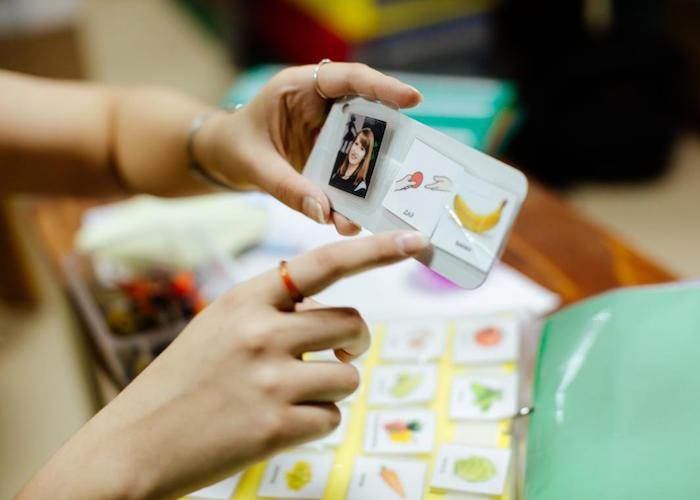
The Picture Exchange Communication System (PECS) uses a set of picture cards to help children on the autism spectrum communicate their feelings and wishes. © UNICEF
New skills and a way to communicate
In Lviv, the family got in touch with specialists working at the children’s center.
"Dzherelo Children's Rehabilitation Center received us with respect and dignity,” said Victoria. “My daughter masters new skills and knowledge. She's developing and at her own pace.”
Before she began using the PECS communication method, Theona would pull on her mother's hand to ask for something. Now, thanks to the work of UNICEF specialists, she simply presents the relevant card to explain her feelings and wishes.
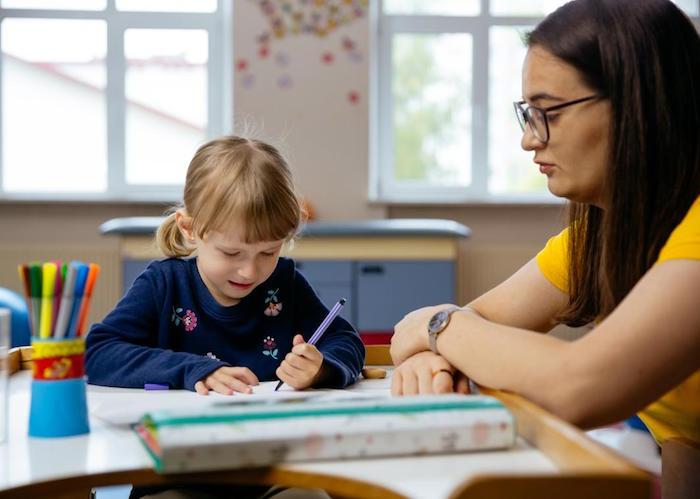
Sophia Shakur, a speech therapist at Dzherelo Children's Rehabilitation Center in Lviv, Ukraine, says 4-year-old Theona is making great progress. © UNICEF
A chance to grow and thrive
"Communication is getting better, as well as her mood,” said Victoria.
Since Theona began attending the children’s center, Victoria has also signed her up for an inclusive kindergarten, where she can socialize and expand her social circle.
"Theona began to communicate more with relatives at home," explained Sophia Shikur, a speech therapist at the center. "Now she can say what she wants and what she doesn't want to do. The PECS system allows her to take an active part in family life, like playing with her older brother. I believe Theona is making great progress."
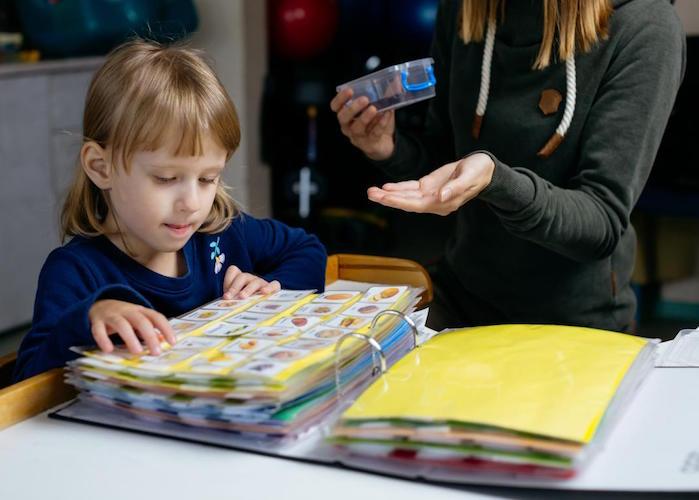
Theona uses the picture cards to communicate with her brother, her parents and her kindergarten classmates. © UNICEF
Individualized support for children and their families
As part of the UNICEF project, staff at the children’s center provide internally displaced families who are raising children with disabilities with consultations and help them adapt to a new place. Every child needs an individual approach.
"Our main task in the UNICEF project is to give parents a push, to refer the child to specialists who will help him develop and support them," said Sofia.
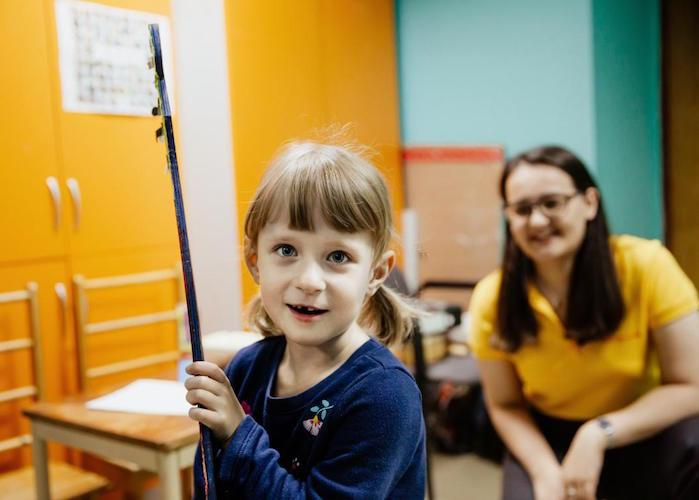
"Children with disabilities are first and foremost children, and they have the same rights that all children have," said Murat Sahin, UNICEF Representative in Ukraine. "So any humanitarian activity should include children with disabilities and offer adequate care, protection and a barrier-free environment. No child should be left behind, especially in times of war. We need to ensure children with disabilities are visible, heard and protected, as all children should be."
Your contribution will help UNICEF continue to reach the children of Ukraine and their families with lifesaving assistance. Please donate.
HOW TO HELP
There are many ways to make a difference
War, famine, poverty, natural disasters — threats to the world's children keep coming. But UNICEF won't stop working to keep children healthy and safe.
UNICEF works in over 190 countries and territories — more places than any other children's organization. UNICEF has the world's largest humanitarian warehouse and, when disaster strikes, can get supplies almost anywhere within 72 hours. Constantly innovating, always advocating for a better world for children, UNICEF works to ensure that every child can grow up healthy, educated, protected and respected.
Would you like to help give all children the opportunity to reach their full potential? There are many ways to get involved.




